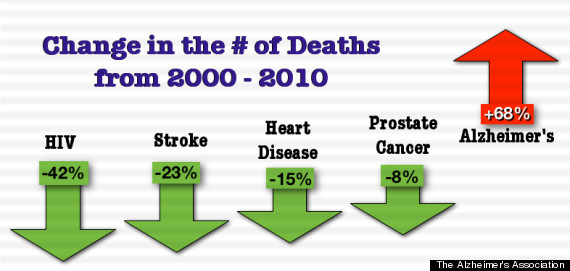
Do you plan to live to 85? If you do, there's a 1 in 3 chance you'll have Alzheimer's. Here's the bad news: There is no cure.
A recent New England Journal of Medicine report reveals that Alzheimer's is now the costliest disease in America. The total monetary cost of dementia could be as much as $215 billion a year. (Medicare pays only $11 billion of this cost.)
I was the primary caregiver for my aunt, who was never diagnosed but definitely had dementia for the last five years of her life. For this reason, I took special interest recently when my friend, Chris, temporarily took over the caregiver duties for his dad who has Alzheimer's.
Chris, a single dad with two pre-teen boys, spent one week caring for his father. Juggling work, his kids and a dad with dementia, well... it nearly killed him. "I had no idea how much stress it is for my mom, who is the primary caregiver," Chris laments.
For most people, both the monetary and emotional impact of Alzheimer's is a shock. Chris had no idea until he did it himself. (And he didn't take on the financial burden). As a motivational speaker, I was traveling constantly, so it cost me a lot of money to hire people to care for my aunt in my absence. It's something you don't think about until it happens to you.
Perhaps this is why 80 percent of the people on the National Alzheimer's Association Board of Directors have a personal connection to the disease. Board President Gerald Sampson says, "I didn't know what Alzheimer's was. I just knew my mother was behaving very unusually." By the time he learned of the disease and she was diagnosed, she was in mid-stage.
"The shock is tough to take," says Sampson, former CEO of Neiman Marcus. "The real shocker is you walk in and your mother doesn't know who you are. That's a painful day."
It sounds odd, but the good news is: It could happen to all of us. Good, only because it might be a wake up call for the country. Alzheimer's is an epidemic. Leaving the solution up to nonprofit fundraising is not enough. Government needs to fund more research for Alzheimer's before it is too late.
Gerry Sampson says:
Worldwide there are more than 35 million people living with the disease. 5 million in the US. People think it is as an old person's disease but 200,000 are under the age of 65. I met a young lady whose husband was diagnosed with Alzheimer's when he was 30 years old. That's the youngest I've experienced but there are many in their 40s and 50s.
1 in 9 people over age 65 in the United States have Alzheimer's. Over age 85, it is 1 in 3. You have a better chance of dying from Alzheimer's than of heart disease, aids or cancer, according to Alzheimer's Association research. So if you live to be 85, those are your chances.
Sampson says, "It's the only disease of the top ten killer diseases where there is no cure, no way to slow it down or even stop the progress. It is fatal."
For the 5 million who have the disease, there are 15 million people serving as caregivers. (Remember, it's a 24/7 job.) Chris found the next bit of eye-opening information even more disturbing because his father's primary caregiver is his mother: Rough statistics show that 30 percent of caregivers die before those they are caring for.
The Alzheimer's Association is pushing hard to make sure the leadership of the country is aware. "Research has made a huge difference with other diseases," Sampson says. "Because the government allocated money for research, the change in the number of deaths from 2000 to 2010 from HIV is down 42 percent. Strokes down 23 percent. Heart disease down 15 percent. Prostate cancer down 8 percent. But during that same period, deaths from Alzheimer's disease are up 68 percent."

"If we don't stop the progress of this disease by 2050 the cost is going to be a trillion dollars a year," Sampson warns, "If we think that Medicare has financial problems now, they'll be out of business. Obviously it will have a huge impact on the nation's finances."
What would it take to stop the disease by 2025? Sampson says:
The Alzheimer's Association convened some of the top researchers in the world to come up with a budget. They estimated that we need 2 billion dollars a year for medical research. That's less than half of what is spent on heart research or cancer, so it is a doable number. But right now only 650 million is being allocated, so we still have a long way to go.
What can you do?
1. The next time you are invited to a nonprofit fundraising event for the Alzheimer's Association, say yes.
2. Contact your representative in Congress to ask for research funding.
3. Raise money on your own to help out. Here are 3 tips on how to raise money for charity.
For a growing number of middle-class Americans, retirement might not arrive until the ripe age of 80. Let's hope that ripe old age doesn't include Alzheimer's.
Meanwhile, in the depths of the storm there is a rainbow. For people like Chris and his mother, the Alzheimer's Association provides considerable support including a 24 hour hotline with experts who can answer almost any question of concern to a caregiver.
10 warning signs: Read it here.
Resources for Caregivers: Click here.
24 hour hotline: 1.800.272.3900
If you know people who could benefit from this information, please share.